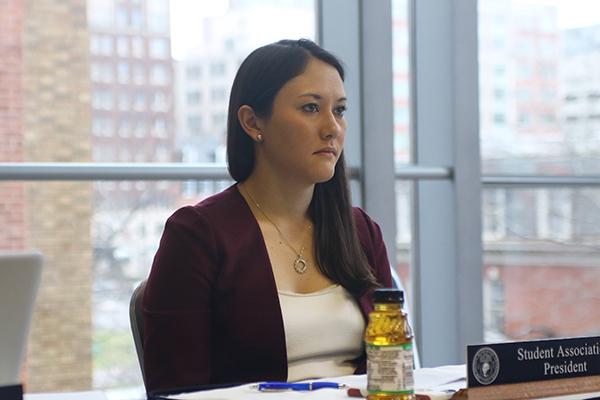Updated: Feb. 8, 2016 at 10:38 a.m.
Officials have approved renovations to the first floor of the Marvin Center, the president of the Student Association announced Friday.
The planned renovation would transform the space from the main lobby to Columbian Square, the J Street dining area. SA President Andie Dowd and former Executive Vice President Casey Syron have advocated to keep the space student-centric since they were elected last spring, as other parts of the building and campus have been turned into administrative space in past years.
Dowd said the renovations could amplify the University’s appeal to prospective students. The space set to be renovated is located next to the undergraduate admissions office, where prospective students gather for tours when visiting GW.
“We want to attract new students to GW and show them the amazing things we have to offer, which means having a fantastic student union as soon as they walk into the Marvin Center and make their way way to the admissions office,” she said.
Dowd said in her presentation Friday that she hopes the Marvin Center will be a “living room” where students can gather. She said long tables would likely be replaced by couches to create a more comfortable atmosphere. She hopes the space will look more like student unions at other universities, where students can meet up for reasons other than eating at one of the vendors in the building.
University spokesman Kurtis Hiatt said officials did not yet have information on the timeline for renovations or how much funding would be set aside for the work. The space was last fully renovated in 1998, with a $20 million facelift.
For years, students and administrators have faced off on the allocation of space on campus. Former SA leaders have pushed for more space for students, including presenting a five-year plan to transform the third floor terrace into student offices.
Officials also rejected a 22-page proposal to make more buildings available to students on campus, only agreeing to allow students in Marvin Center conference rooms after hours and extending the hours of Duquès and Funger halls until 2 a.m.
Greek life offices also were housed on the fifth floor of the Marvin Center, before a hub of administrative offices took over the space in 2012. The student organizations’ shift to the fourth floor added 33 percent more space for the groups, student leaders said at the time.
“The Marvin Center has recently not been considered a student union. It’s not a place where students gather on Friday afternoon and hang out at J Street,” Dowd said. “I think we should strive to make it that. Especially because it is the center of campus and it is our student’s center.”
A group of interior design students, three undergraduate and two graduate, have drawn up rough sketches for what the space could look like after the renovations, although exact details have yet to be worked out, Dowd said.
Dowd, who campaigned in part on a platform that included keeping the Marvin Center student space, said the changes would create a greater sense of community on campus, attract prospective students and alleviate students’ concerns about affordability by encouraging them to stay on campus instead of going to pricier options to spend time.
“We build community in our freshman year halls with our neighbors, but how do we build community in the University as a whole? I think it starts with a student union,” she said.
Dowd said members of the SA will meet with senior administrators to figure out an exact plan for the renovations. She said the SA doesn’t yet know how much the project would cost or when the work would begin.
She added that the SA has been researching student unions at GW’s peer schools to determine which are the most successful and which students would be most likely to “call home.”
University President Steven Knapp said that administrators have looked into “lots of opportunities to make campus a more welcoming environment for our students, and just more of a home for our students.”
“I think that’s particularly important here in Washington, D.C. because there are so many things to do off campus, but it’s really important to build a strong sense of community on campus,” he said.
Knapp said having a space where students could gather to create friendships would help to build an alumni network that would “open doors” for students in the future.
Knapp said the dining vendors in District House, the new residence hall scheduled to open in the fall, would likely open up space in the Marvin Center. The University had the option to create more event or office space in the Marvin Center, but found it “most attractive” to create more student space, he said.
This post was updated to reflect the following correction:
The Hatchet incorrectly reported that the fifth floor of the Marvin Center used to house student offices. The fifth floor of the Marvin Center used to house Greek life offices. We regret this error.







